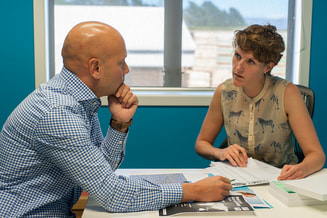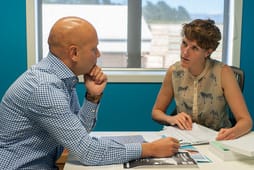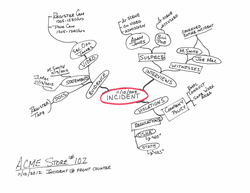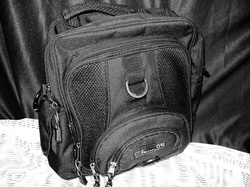|
,Let's face it. Not all Private Investigators are the best organized when it comes to "paperwork" (we are referring to both digital case file information and real paper). So what do you do???? Here's some advice, not necessarily new advice mind you, from one of the most disorganized private investigators we know. (She asked that we withhold her name - so we named her "Messy").
Private I HQ: "How do you stay organized since we're told you're disorganized?" Investigator "Messy": "For paperwork I use pocket file folders. One for each case I'm actively working. I simply take all paperwork, like my receipts, copies of evidence, all of it, and put them in the folder. Now it's all in one place. I throw a couple of blank sheets of paper in there for my notes, expense and time logs." Private I HQ: "OK, Investigator "Messy", what do you do about electronic files?" Investigator "Messy": "The same thing. I make a file on my computer desktop with the case number as the name. When I receive an email in reference to a case I save it to a PDF file and then drag and drop in the case file folder on my desktop. Digital files, like surveillance video, or statements, I do the same thing. By the way, a neat thing you can do, I guess depending on your computer, you can right click and print and everything in the folder, except the videos of course. I can then add those to my pocket file folders when I'm on the road." Private I HQ: "That sounds pretty organized. Why do you feel you are disorganized?" Investigator "Messy": "My friends remember how it was for me before I set-up this system. My desk was always piled high with papers. I mean really piled up. You couldn't see the top of my desk." [She places her hand about a foot above the table showing the height:-)] "I felt like I could find everything, and I could. It just took me a long time. Now I simply grab the case file folder, or open it on my desktop and look for what I need. The key is to put anything in the folders as soon as possible. Immediately! I know other investigators that do the exact same thing. So, it's not my idea, just an idea that I put in to motion because of the ribbing I took from friends and family." Private I HQ: "Why not an electronic case file system?" Investigator "Messy": "Cost and it's just me. Also, I tailor my completed reports for what the client needs. Sometimes that's hard to do with an electronic file system. And, for me, having an electronic report writing system requires me to be tied to a desk. I'm on the go a lot and often work away from the office. I'm sure there's an online solution out there, but again, it's a cost issue. A cost that would ultimately have to pass on to my clients." Sometimes, the tried-and-true, simple method is the best.
0 Comments
 Mirror body language such as leaning forward if they are. Mirror body language such as leaning forward if they are. Conducting interviews is critical to any investigation. Private investigators use information gained from interviews to identify suspects, verify facts, or find leads to successfully conclude an investigation. Since interviews are so critical it makes sense for a private investigator to invest a few minutes to build rapport to increase the information they will receive. Building rapport is not an art, it only takes a few minutes and when you focus on building rapport with someone you are interviewing you will receive more information than you would have without. Steps to building rapport: 1. Don't rush in to the interview - Take a few minutes to talk with the person. Find topics of common interest. "How do you like working here?", "Did the weather cause problems commuting to work today?" This allows the person to become at ease with you, and for you to feel more at ease with them. Often a few minutes of talking about topics other than the purpose of the interview will help overcome resistance. 2. Mirror the individual using body language - If the person is leaning forward on the table, do the same. If they are sitting relaxed, do the same. Mirroring someone's body language subconsciously puts them at ease with you. Don't be too obvious, just mirror their body language every few minutes. 3. Practice active listening - The point of the interview is to listen. Some investigators have a tendency to interrupt, or cut someone off when they are talking to try and get to the point. Even if the individual rambles when talking with you, allow them time to just talk. It may be a sign they are becoming more at ease. Also, they will be encouraged to talk more when you ask the hard questions. Paraphrase what they say to you make sure you understood them correctly as well as signaling them that you are listening. 4. Be empathetic - Letting them know that you understand how they felt about a situation will further develop trust. "I see that you were angry." "Other people would feel bad if that happened to them." Being empathetic does not mean you agree, rather you are trying to understand their emotional viewpoint. One investigator shared that by being empathetic the individuals would often share more information about an incident, sometimes confessing. 5. Be respectful to the other person - Some people are hard to respect because of their actions, or attitudes. By always being respectful towards them you increase your chances of breaking down their resistance, or increasing the chances they will lower their guard when talking to you. Building rapport will increase the effectiveness of your interviews, and allow you gain more information. Often the information that will be provided will be more accurate than just asking specific questions. Private investigations is a for profit business. Getting the investigation right is critical for private investigative firms to maintain their reputation, and gain additional business. Here are a few tips that seasoned private investigators shared to make sure they get every investigation right!
Getting any investigation right takes a lot of skill, planning, preparation and then proper execution.  As a private investigator you interview a lot of people with information about your case. Interviewee’s often include; clients, witnesses, suspects, and others such as; subject matter experts with knowledge germane to the investigation. Following are the “Lucky 7” steps to a successful interview:
Pre-planning your interview by following these simple steps will help you get the most out of any interview you conduct. (Below is a sample interview you can download)
"Bending the rules every now and then is not that big of a deal."
Unfortunately there are former private investigators that now disagree with that statement. Taking "short-cuts" can lead to the development of habits. When private investigators are caught bending the rules the consequences have long-term consequences. Bending the rules, no matter how slight the infraction, will create consequences for your colleagues. We have all seen news stories of private investigators that have been arrested or lost their license. Allegations range from impersonating a police officer, illegal wiretapping, to intimidating witnesses in criminal proceedings. There are many other situations, many that never make the news outlets, where private investigators lose their ability to practice their trade for ethics violations. Falsifying reports, billing statements, and other ethics violations that at the time where not considered a "big deal" to the investigator. When a private investigator is caught bending the rules the consequences are far reaching. Not only do they risk their ability to practice their trade as an investigator they can endanger the case for their client. If caught falsifying, or as one said, "stretching the truth", can lead to the client losing their case. The costs are considerable to the private investigator, their current client and potentially past clients. There is a camaraderie among private investigators that is evident when ever a group gets together whether at a convention or a private investigator organization meeting. Private investigators that get the reputation of bending the rules often become outcasts. Why? The actions of one private investigator negatively impacts the profession. When a news story breaks in a community about a private investigator caught in an unethical practice, how does that impact the remaining investigators? The public can be less inclined to employ a private investigator when needed. If you ever consider "bending the rules" to complete an investigation, know that when you are discovered the impacts are long-term, they impact others such as your clients and your colleagues. http://www.williamsondailynews.com/view/full_story/19886980/article-private-investigator-stevens-arrested http://www.yakimaherald.com/news/latestlocalnews/1527733-8/private-investigator-arrested-for-alleged-witness-tampering  Private investigators are often contacted early in a divorce process to provide services. Providing some sound advice for them to follow as they prepare for divorce will empower them and reduce some of the stress they will experience as a part of the process. If they have explored all of the options to save their relationship and find that divorce is the only option share the following tips with them before they begin the process: 1. Create a list of property and financial assets. List cars, boats, household goods and any other assets you own. Photograph the items to show their present condition. Where possible, include the purchase dates value at the time of purchase and a brief description of how the property is used and by whom. Most important, identify where the assets are located. 2. Gather health insurance coverage information for you and your children. Obtain copies of health insurance plans. Attorneys will need to negotiate health insurance coverage as a part of the divorce. It will be easier to gather health insurance information prior to beginning a divorce. If there are long term prescriptions or health needs, make a list and include a copy of the last two or three months of bills. 3. Get a post office box and start re-directing your financial mail and legal documents. Getting a post office box will allow you to redirect your credit card statements, receive important legal documents from your attorney, and provide security that mail will not be intercepted. 4. Start putting money aside. Start saving money to help with legal, moving and unexpected expenses while your divorce is being negotiated. During a divorce it is possible that some of your joint assets will be frozen or held until a final agreement is reached. 5. Open saving and checking accounts. Once the divorce proceedings are started you may not be able to access funds in joint accounts. It is important that you have a checking and savings account started to help you with the transition and to start building your credit. Let your attorney know about the accounts. 6. Open credit card accounts. Open credit card accounts in your name only before the divorce. This will help you establish your credit, receive better interest rates if you are not working. You may also need the credit to help with expenses during the initial divorce proceedings as joint accounts may not be accessible. Important: depending on your state you will be responsible for any charges made on the new accounts. 7. Get a copy of your credit report. Look for lines of credit, or credit cards that you were not aware of. If found, share this information with your attorney and/or private investigator. Also, prior to the divorce proceedings you will want to dispute any inaccuracies that may appear in your credit report, clear up any errors. Keep a copy for later use. 8. Change your will, beneficiaries on insurance policies. Remove your spouse from any living wills or wills you may have. It will be easier to make these changes prior to the divorce. It may become more complicated to make changes after the divorce. When changing beneficiaries on insurance policies, be aware that your spouse may be contacted. Talk with your insurance provider to understand the complete process. 9. If you suspect your spouse is having an affair. Don’t confront your spouse or the person you believe they are having an affair with. Gather information such as receipts, names of witnesses but don’t confront them. Share this information with your attorney and/or private investigator. Confronting a cheating spouse prior to the divorce provides them the opportunity to hide or terminate the relationship. Confronting the other individual could land you in legal trouble. 10. Get professional help—legal and financial help are invaluable, particularly when dividing property. It is important that you have legal representation. Negotiating on your own or trying to navigate the legal requirements requires experienced professionals. Let your attorney deal with the legal issues and take some of your worries away. Consult with an attorney as soon as possible. No matter the circumstances, the divorce process is difficult and challenging for the individuals involved. Providing them with some useful tips to prepare will keep them in control of their situation. And, if they change their mind and continue the relationship, none of the above tips would put them in an irreversible position.  Mobile surveillance techniques vary among private investigators depending on their resources, the subject of their surveillance and the investigator’s personal preferences. Although the specifics may vary there are five common practices used by successful private investigators. 1. Gather advance intelligence information about the subject and subject vehicle - License plate, addresses for home and work, photo’s of distinguishing features of the subject vehicle, maps of subject’s neighborhood and workplace, scouting areas in advance where the subject is likely to visit are all critical advance intelligence that you need before beginning the surveillance. Use an online map program to “drive” the areas where you are most likely to encounter the subject. 2. Stock your vehicle with all the necessary supplies before starting the mobile surveillance - back-up camera batteries, cell phone charger, voice recorder, snacks and other essential items. There is nothing worse than realizing you left an important piece of equipment at the office when you are out on a mobile surveillance. Again, back-up batteries and chargers for all your electronic devices you may need. 3. Maintain visual contact with the subject at all times - easier said than done, but maintaining constant visual contact by staying in close proximity to the subject ensures you do not lose them in traffic. In heavy traffic conditions close the distance. In light traffic conditions increase your distance from the subject. 4. Take detailed notes during the surveillance - use a voice recorder, preferably one that timestamps your recording, to make verbal notes throughout the surveillance so you can retrace or identify the location of critical camera video. 5. Drive safely and obey the traffic laws - Whenever you are conducting mobile surveillance remember your duty to protect others. Obey traffic laws, drive defensively, and be aware of your surroundings. Speeding, making erratic maneuvers, or disobeying traffic signals could cause an accident ending your surveillance.  Click the image for a larger view Click the image for a larger view Ever think you have completed an investigation only to find there was one more interview to complete, another document that you need to collect, or a piece of evidence you forgot to look for? Ever had a difficult time explaining the linkages among interviews and evidence to a client? How do you ensure you are completing all the tasks associated with your investigation? Creating a task list is one way, but sometimes it might lack the ability for you to visualize important information you need to seek out. Using a mind-map is another technique that might be useful to you in completing an investigation. A mind-map is simple hand drawn chart, like one in the graphic, allows you to visualize your investigation, look for links and create checklists. Take a few minutes to scratch out a simple mind map to see how useful it can be on a current or upcoming investigation. There are free programs online you can use to create and print a mind map as well.  Every Private Investigator should have a jump bag in their vehicle. Taking the time to set-up a small, inexpensive bag with essential items and placing one in your car, office and home is a great preparation idea that is inexpensive and will help you in emergency situations. Use any bag that can hold essential items you might need in an emergency situation. You never know when a case might take a different direction. So what do you include in your bag?
Having a small bag in your car with these essential items will prepare you for any loss of essential equipment, a sudden schedule change during surveillance or if you have to make a quick overnight trip unexpectedly. (This blog post is repeated in our Article Interview section)
We asked several PI’s and police investigators “What is the most critical investigative skill for an Investigator?” Skills commonly mentioned were: communications, interviewing techniques, social skills, analytic ability, but observation quickly rose to the top of the list. So what is observation and how can a PI improve this skill? By definition... ob·ser·va·tion [ob-zur-vey-shuhn] noun 1. an act or instance of noticing or perceiving. 2. an act or instance of regarding attentively or watching. 3. the faculty or habit of observing or noticing. 4. notice: to escape a person's observation. 5. an act or instance of viewing or noting a fact or occurrence for some scientific or other special purpose So how do you improve your powers observation? Whenever you are engaged in an investigation make a conscious effort to be observant. Sounds simple but how? 1. Clear your mind of any pre-conceived ideas of thoughts about what you observing. A police colleague said that whenever he interviewed a suspect he always approached and observed the individual as if they were innocent. By doing this he was more open to catching statements, or facts that did not quite add up if the person was truly innocent. 2. Avoid developing tunnel-vision by making an effort to take a wide, panoramic view of anything you are observing. View the area immediately around the focus of your investigation. Be observant not only to body language when talking to someone, but observe how they are dressed, listen to how they frame their sentences. 3. Take notes. Duhh!!!! One of the best ways to increase your observation skill is to write down your observations. This causes you to think about what you are observing and focus and helps with number 4. 4. Slow down! Observe situations, people from different perspectives. To help, sketch scenes, diagram statements from people you interview and create timelines. This forces you to slow down and gain a better perspective increasing your observation. 5. Be inquisitive. Even when all appears normal ask someone more familiar with the setting or incident. A police investigator investigating a robbery by sudden snatching from a store register while the clerk was counting money asked a different clerk if it was normal task for a clerk to complete at that time of night. To her surprise the clerk said no, they only counted money when another clerk came on to relieve them. Inside theft-case solved! Work on your powers of observation by making a conscious effort each day to be observant. |
PI HQPI HQ is dedicated to bringing you important information that impacts the private investigations world. Archives
July 2019
Categories
All
|
||||||
|
Information of interest to professional private investigators.
|
Site created and maintained by Holmes-Tech LLC
 RSS Feed
RSS Feed